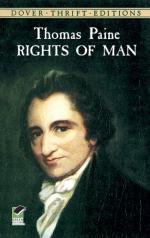
|
| Name: _________________________ | Period: ___________________ |
This test consists of 15 multiple choice questions and 5 short answer questions.
Multiple Choice Questions
1. After pointing out the weaknesses of Burke's position, what did Paine indicate about Burke's principle of past English laws?
(a) It contradicted itself.
(b) It outsmarted itself.
(c) It diminished itself.
(d) It defeated itself.
2. What did Paine do to help the cause being fought for in the American Revolution?
(a) He made an ethical case for it, planned its strategy, and supported the troops.
(b) He made a political case for it and planned its strategy.
(c) He supported the troops and planned the war's strategy.
(d) He made a political case for it and supported the troops.
3. Which aspect of the government's presumed knowledge could not be accounted for by Burke, according to the listing of his view's problems in the Miscellaneous Chapter?
(a) Its extent.
(b) Its origin.
(c) Its relevance.
(d) Its limit.
4. When did the burning and devastation of London take place that Paine referred to in his attempt to disprove Burke's opinion of the French people?
(a) 1730.
(b) 1770.
(c) 1780.
(d) 1750.
5. Why did Paine think that Burke refused to compare the French and British Constitutions?
(a) The French Constitution was more difficult to understand.
(b) The French Constitution was better.
(c) The English Constitution was incomplete.
(d) The English Constitution was not being applied.
6. Along with Dr. Price, which society did Paine think that Burke maligned?
(a) Society for Constitutional Information.
(b) Freedom Society.
(c) American Revolution Society.
(d) Society for Law and Justice.
7. Which word did Paine use to describe the monarchy in the Miscellaneous Chapter?
(a) Scam.
(b) Fallacy.
(c) Fraud.
(d) Illusion.
8. What is a good description of the second part of Rights of Man?
(a) Biographical.
(b) Philosophical.
(c) Fictional.
(d) Autobiographical.
9. What did Burke think about England's past laws?
(a) They should only be altered every one hundred years.
(b) They should only be altered every two hundred years.
(c) They could be altered.
(d) They could not be altered.
10. What impressed Paine about the National Assembly in Rights of Man?
(a) Their ability to restrain revolt.
(b) Their patience.
(c) Their objectivity.
(d) Their ability to prevent revolt.
11. As Paine pointed out in the Miscellaneous Chapter, what did Burke think the government had a monopoly on?
(a) Trade.
(b) Power.
(c) Wisdom.
(d) Commerce.
12. What did Paine say made actions right or wrong with Burke's flawed line of thinking?
(a) Speculation.
(b) The past.
(c) The future.
(d) Stipulation.
13. Ending the Miscellaneous Chapter, what did Paine think was missing from Burke's objection to the French Revolution?
(a) Intent.
(b) Honor.
(c) Validity.
(d) Support.
14. According to Paine in the Miscellaneous Chapter, what did tyranny in the English government cause?
(a) Political and economic instability.
(b) Political instability.
(c) Political, economic and international instability.
(d) Economic and international instability.
15. What did Paine say in the Preface that the people would have to see in order for Liberty to prevail?
(a) Truth.
(b) Victory.
(c) Possibility.
(d) Reason.
Short Answer Questions
1. Instead of rights, what did Paine say was included in Burke's arguments?
2. What did Paine say was the cause of the removal of aristocratic title for the French people?
3. How did Paine describe reasoning with the states in the Preface?
4. As he stated in the Preface, who did Paine specifically intend to give an accurate account of the war to by writing Rights of Man?
5. How did Paine describe the mismanagement of government finances in countries like England and France?
|
This section contains 535 words (approx. 2 pages at 300 words per page) |

|




